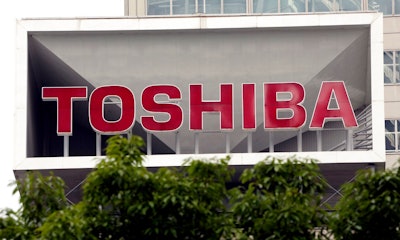
TOKYO (AP) — Toshiba's long meandering sale of its computer memory business took another turn Wednesday, as the Japanese nuclear and electronics company's announcement of a deal with a consortium was immediately met with opposition from U.S. joint venture partner Western Digital.
Embattled Toshiba Corp. needs the sale of its lucrative NAND flash-memory SanDisk joint venture to survive. But Western Digital has begun legal action, opposing the sale to anyone else.
Toshiba sank into the red for the fiscal year through March. Its money-losing nuclear business in the U.S., Westinghouse Electric Co., filed for bankruptcy protection in March.
In the latest move, Toshiba said it entered a memorandum of understanding with Bain Capital Private Equity, which leads the consortium that also includes South Korea's SK Hynix, and hoped to enter a final decision by the end of this month.
But Western Digital protested within hours of the announcement.
"We are disappointed that Toshiba would take this action despite Western Digital's tireless efforts to reach a resolution that is in the best interests of all stakeholders," it said in a statement, stressing that it has also offered many proposals.
Toshiba said it was talking with two others bidders — Western Digital's consortium and another that includes Hon Hai, also known as Foxconn, of Taiwan. Bain has now come up with a new proposal, it said, while noting other negotiations were also ongoing.
"Toshiba intends to reach a definitive agreement that fully meets our objectives at the earlier possible date," Senior Executive Vice President Yasuo Naruke said.
Western Digital, which bought SanDisk last year, has argued the sale might violate terms of the joint venture with Toshiba. Such sales can be sensitive because they involve the transfer of technology.
Toshiba had said in June its preferred bidder was the Bain consortium, which also includes Innovation Network Corp. of Japan and the Development Bank of Japan, for the sale of the unit called Toshiba Memory Corp.
But after Western Digital opposed the move, it said it was talking to others.
Toshiba's massive red ink began with the reactors it has been building in the U.S., which are still unfinished, partly because of beefed up safety regulations following the 2011 Fukushima nuclear disaster.
Bain Capital Private Equity, based in Boston, is one of the world's leading investment firms. The Development Bank of Japan is backed by the government of Japan. The Innovation Network Corp. of Japan is made up of 26 big-name Japanese corporate investors, including Sony Corp., Canon Inc., Toyota Motor Corp. and Sumitomo Mitsui Banking Corp.
Toshiba's earnings reports initially failed to get endorsements from its auditors, meaning that it could have been delisted.
But the auditors finally signed off in August after an investigation that centered on whether Toshiba had known in advance the subsequent losses that emerged related to Westinghouse's acquisition of CB&I Stone & Webster, a nuclear construction and services business.
In 2015, Toshiba acknowledged it had been systematically falsifying its books since 2008, as managers tried to meet overly ambitious targets. An outside investigation found profits had been inflated and expenses hidden across the board.






















